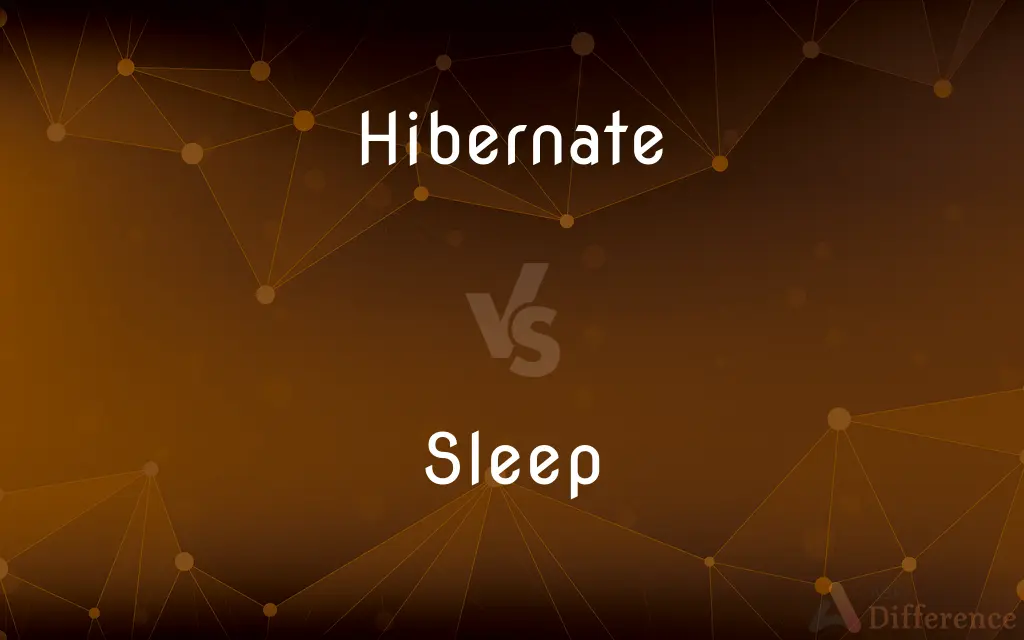Hibernate vs. Sleep — What's the Difference?
Edited by Tayyaba Rehman — By Fiza Rafique — Updated on March 26, 2024
Hibernate saves the computer's state to the hard drive and powers down, using no power, while Sleep mode saves the state to RAM and uses minimal power, allowing for quicker wake-up.

Difference Between Hibernate and Sleep
Table of Contents
ADVERTISEMENT
Key Differences
Hibernate mode is designed to save a computer's current state, including open documents and running applications, directly to the hard drive before shutting down completely. On the other hand, Sleep mode, also known as Standby mode in some systems, saves the computer's state to RAM, a much faster memory compared to a hard drive or solid-state drive. Because RAM is volatile memory and requires power to maintain data, the computer remains in a low-power state, using just enough power to keep the RAM active.
The choice between Hibernate and Sleep modes depends on the user's needs. Hibernate is more suited for times when the computer will not be used for an extended period and conserving battery life is crucial. It is especially beneficial for laptops and mobile devices that may not have access to a power source for some time. Sleep mode is more appropriate for short breaks, allowing users to quickly resume work with minimal delay. It is particularly useful in environments where constant access to computer applications and documents is needed, and the slight power consumption is not a concern.
From a technical standpoint, Hibernate mode requires enough hard drive space to save all contents of the RAM. This means that if a computer has a large amount of RAM, it will need a correspondingly large amount of free hard drive space to hibernate successfully. Conversely, Sleep mode's reliance on RAM does not increase the storage requirements but does rely on the continuous supply of power to keep the data intact.
Security considerations also differentiate the two modes. While both modes save open documents and applications, Hibernate mode, by powering down the computer, adds an additional layer of security by requiring users to go through the boot process and potentially enter a password upon waking. Sleep mode, while quicker to resume, may be less secure if someone gains physical access to the computer during its low-power state.
Both Hibernate and Sleep modes serve to enhance the user experience by providing options to save work and power while allowing for a faster return to productivity compared to a full shutdown and restart. The choice between them hinges on balancing the needs for quick accessibility, power conservation, and security.
ADVERTISEMENT
Comparison Chart
Power Consumption
None, as the computer powers down completely.
Minimal, to maintain the state in RAM.
Wake-up Time
Slower, as the state is loaded from the hard drive.
Faster, due to loading the state from RAM.
Storage Requirement
Requires hard drive space equivalent to RAM size.
Does not require additional storage space.
Ideal Usage
Extended periods of inactivity, to save battery life.
Short breaks, for quick resume of work.
Security
Higher, as it requires booting up.
Lower, if physical access to the computer is obtained during sleep.
Compare with Definitions
Hibernate
Slower wake-up but no power use.
After hibernating, the laptop took a bit longer to wake up but had full battery.
Sleep
Quick wake-up, suitable for short breaks.
After a short coffee break, his computer instantly woke up from sleep.
Hibernate
Adds a layer of security upon wake-up.
Hibernating the PC requires a password on wake-up, enhancing security.
Sleep
Minimal power consumption keeps data intact.
The laptop used very little battery while in sleep mode overnight.
Hibernate
Saves computer state to hard drive, powers down completely.
He hibernated his laptop to save battery on the flight.
Sleep
Saves state to RAM, uses minimal power.
She put her PC to sleep during lunch for a quick resume later.
Hibernate
Ideal for conserving battery over long periods.
Hibernate your computer overnight to conserve energy.
Sleep
Less secure if accessed physically.
Leaving a computer in sleep mode in public places might pose a security risk.
Hibernate
Requires significant hard drive space.
Ensure enough disk space before using hibernate to save all open applications.
Sleep
Does not require extra storage space.
Sleep mode is efficient as it doesn’t use up any hard drive space.
Hibernate
To be in a dormant or torpid state during a cold period, especially during the winter.
Sleep
Sleep is a naturally recurring state of mind and body, characterized by altered consciousness, relatively inhibited sensory activity, reduced muscle activity and inhibition of nearly all voluntary muscles during rapid eye movement (REM) sleep, and reduced interactions with surroundings. It is distinguished from wakefulness by a decreased ability to react to stimuli, but more reactive than a coma or disorders of consciousness, with sleep displaying different, active brain patterns.
Hibernate
To be in an inactive or dormant state or period
"In Lawrenceville people hibernated and life passed them by" (Jacqueline Susann).
Sleep
A natural periodic state of rest for the mind and body, in which the eyes usually close and consciousness is completely or partially lost, so that there is a decrease in bodily movement and responsiveness to external stimuli. During sleep the brain in humans and other mammals undergoes a characteristic cycle of brain-wave activity that includes intervals of dreaming.
Hibernate
To spend the winter in a dormant or inactive state of minimal activity, low body temperature, slow breathing and heart rate, and low metabolic rate; to go through a winter sleep.
Hedgehogs and bears are two of the many mammals that hibernate in winter.
Sleep
A period of this form of rest.
Hibernate
(intransitive) To live in seclusion.
Sleep
A state of inactivity resembling or suggesting sleep; unconsciousness, dormancy, hibernation, or death.
Hibernate
To enter a standby state which conserves power without losing the contents of memory.
Sleep
A state in which a computer shuts off or reduces power to its peripherals (such as the display or memory) in order to save energy during periods of inactivity.
Hibernate
To winter; to pass the season of winter in close quarters, in a torpid or lethargic state, as certain mammals, reptiles, and insects.
Inclination would lead me to hibernate, during half the year, in this uncomfortable climate of Great Britain.
Sleep
(Botany) The folding together of leaflets or petals at night or in the absence of light.
Hibernate
Sleep during winter;
Bears must eat a lot of food before they hibernate in their caves
Certain animals estivate
Sleep
A crust of dried tears or mucus normally forming around the inner rim of the eye during sleep.
Hibernate
Be in an inactive or dormant state
Sleep
To be in the state of sleep or to fall asleep.
Sleep
To be in a condition resembling sleep.
Sleep
To pass or get rid of by sleeping
Slept away the day.
Went home to sleep off the headache.
Sleep
To provide sleeping accommodations for
This tent sleeps three comfortably.
Sleep
(intransitive) To rest in a state of reduced consciousness.
You should sleep eight hours a day.
Sleep
(transitive) To be slumbering in (a state).
To sleep a dreamless sleep
Sleep
To achieve or make happen by manner of sleep.
Sleep your way to good health.
He hoped to sleep his troubles away.
Sleep
(transitive) To accommodate in beds.
This caravan can sleep four people comfortably.
Sleep
(intransitive) To be careless, inattentive, or unconcerned; not to be vigilant; to live thoughtlessly.
Sleep
(intransitive) To be, or appear to be, in repose; to be quiet; to be unemployed, unused, or unagitated; to rest; to lie dormant.
A question sleeps for the present; the law sleeps
Sleep
To wait for a period of time without performing any action.
After a failed connection attempt, the program sleeps for 5 seconds before trying again.
Sleep
To place into a state of hibernation.
Sleep
To spin on its axis with no other perceptible motion.
When a top is sleeping, it is spinning but not precessing.
Sleep
To cause (a spinning top or yo-yo) to spin on its axis with no other perceptible motion.
Sleep
(uncountable) The state of reduced consciousness during which a human or animal rests in a daily rhythm.
I really need some sleep.
We need to conduct an overnight sleep test to diagnose your sleep problem.
Sleep
An act or instance of sleeping.
I’m just going to have a quick sleep.
Sleep
A night.
There are only three sleeps till Christmas!
Sleep
(uncountable) Rheum, crusty or gummy discharge found in the corner of the eyes after waking, whether real or a figurative objectification of sleep (in the sense of reduced consciousness).
Wipe the sleep from your eyes.
Sleep
A state of plants, usually at night, when their leaflets approach each other and the flowers close and droop, or are covered by the folded leaves.
Sleep
The hibernation of animals.
Sleep
To take rest by a suspension of the voluntary exercise of the powers of the body and mind, and an apathy of the organs of sense; to slumber.
Watching at the head of these that sleep.
Sleep
To be careless, inattentive, or uncouncerned; not to be vigilant; to live thoughtlessly.
We sleep over our happiness.
Sleep
To be, or appear to be, in repose; to be quiet; to be unemployed, unused, or unagitated; to rest; to lie dormant; as, a question sleeps for the present; the law sleeps.
How sweet the moonlight sleep upon this bank!
Sleep
To be slumbering in; - followed by a cognate object; as, to sleep a dreamless sleep.
Sleep
To give sleep to; to furnish with accomodations for sleeping; to lodge.
Sleep
A natural and healthy, but temporary and periodical, suspension of the functions of the organs of sense, as well as of those of the voluntary and rational soul; that state of the animal in which there is a lessened acuteness of sensory perception, a confusion of ideas, and a loss of mental control, followed by a more or less unconscious state.
O sleep, thou ape of death.
Sleep
A natural and periodic state of rest during which consciousness of the world is suspended;
He didn't get enough sleep last night
Calm as a child in dreamless slumber
Sleep
A torpid state resembling sleep
Sleep
A period of time spent sleeping;
He felt better after a little sleep
There wasn't time for a nap
Sleep
Euphemisms for death (based on an analogy between lying in a bed and in a tomb);
She was laid to rest beside her husband
They had to put their family pet to sleep
Sleep
Be asleep
Sleep
Be able to accommodate for sleeping;
This tent sleeps six people
Common Curiosities
Why would someone choose Sleep mode instead of Hibernate?
For quick access. Sleep mode allows the computer to wake up faster, making it suitable for short breaks.
Does Hibernate mode use any power?
No, Hibernate mode saves the session to the hard drive and completely powers off the computer, using no power.
What is the main advantage of Hibernate over Sleep?
Hibernate saves power by shutting down the computer while preserving the session state, ideal for extended periods.
Can I use Sleep mode overnight?
Yes, but it's more power-efficient to use Hibernate for such long periods, especially if battery life is a concern.
Can Hibernate and Sleep affect the lifespan of a computer?
Both modes are designed to be safe and should not negatively impact the lifespan of a computer.
Is it safe to move a laptop in Sleep mode?
Generally, yes, since there are no moving parts like hard drive disks active, but moving a laptop in Hibernate mode is safer due to the complete power-off state.
How do I choose between Hibernate and Sleep?
Consider how long you'll be away from your computer and whether saving battery life or quick wake-up is more important.
Does every computer support Hibernate and Sleep modes?
Most modern computers support both, but availability can depend on the operating system and hardware capabilities.
What happens if the power goes out while in Sleep mode?
Data not saved to the hard drive may be lost since Sleep mode relies on continuous power to maintain the state in RAM.
How do I enable Hibernate mode?
This can vary by operating system, but it typically involves adjusting the power settings in the control panel or system preferences.
Share Your Discovery

Previous Comparison
Horse vs. Moose
Next Comparison
Embedment vs. EmbedAuthor Spotlight
Written by
Fiza RafiqueFiza Rafique is a skilled content writer at AskDifference.com, where she meticulously refines and enhances written pieces. Drawing from her vast editorial expertise, Fiza ensures clarity, accuracy, and precision in every article. Passionate about language, she continually seeks to elevate the quality of content for readers worldwide.
Edited by
Tayyaba RehmanTayyaba Rehman is a distinguished writer, currently serving as a primary contributor to askdifference.com. As a researcher in semantics and etymology, Tayyaba's passion for the complexity of languages and their distinctions has found a perfect home on the platform. Tayyaba delves into the intricacies of language, distinguishing between commonly confused words and phrases, thereby providing clarity for readers worldwide.















































